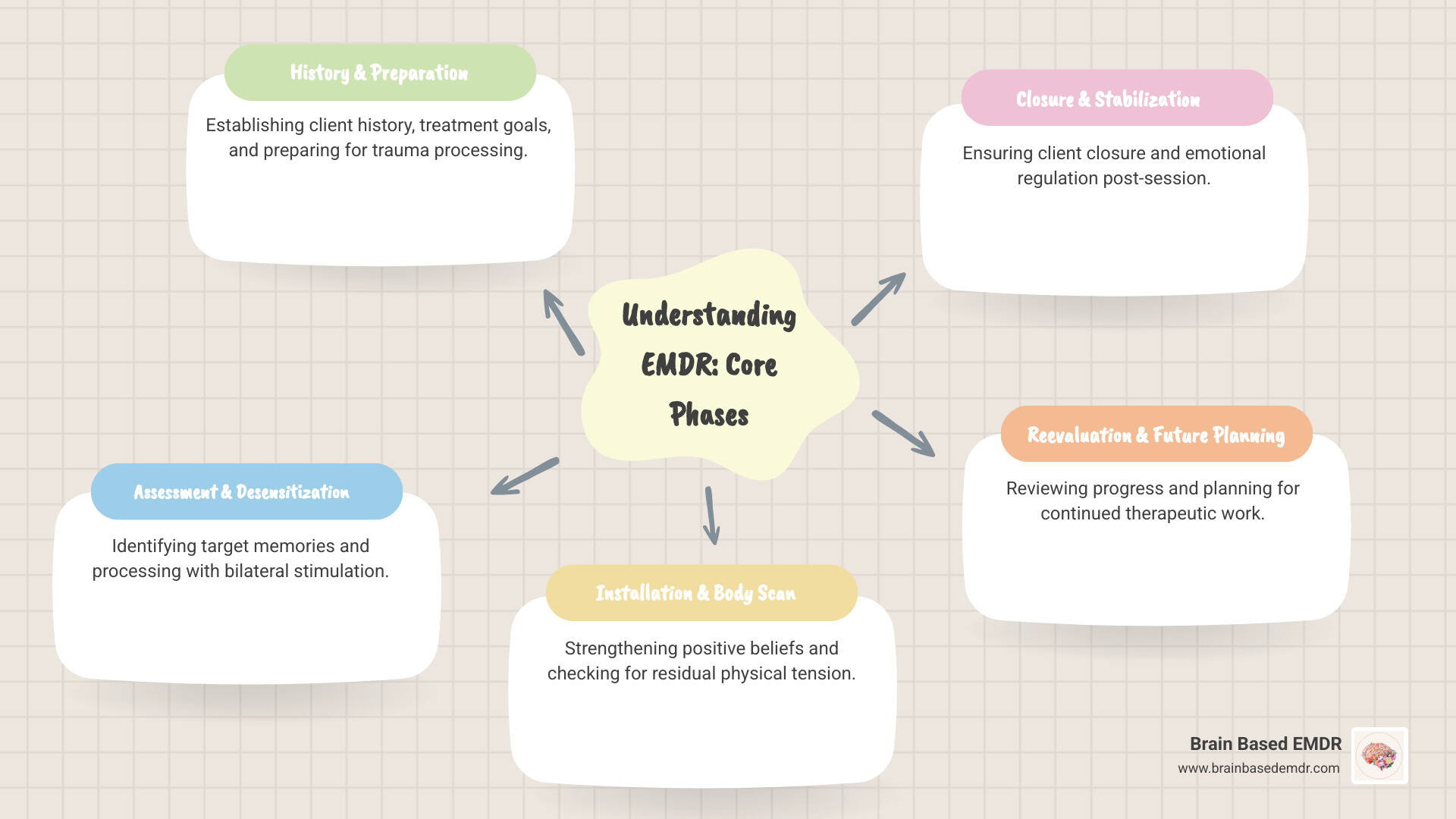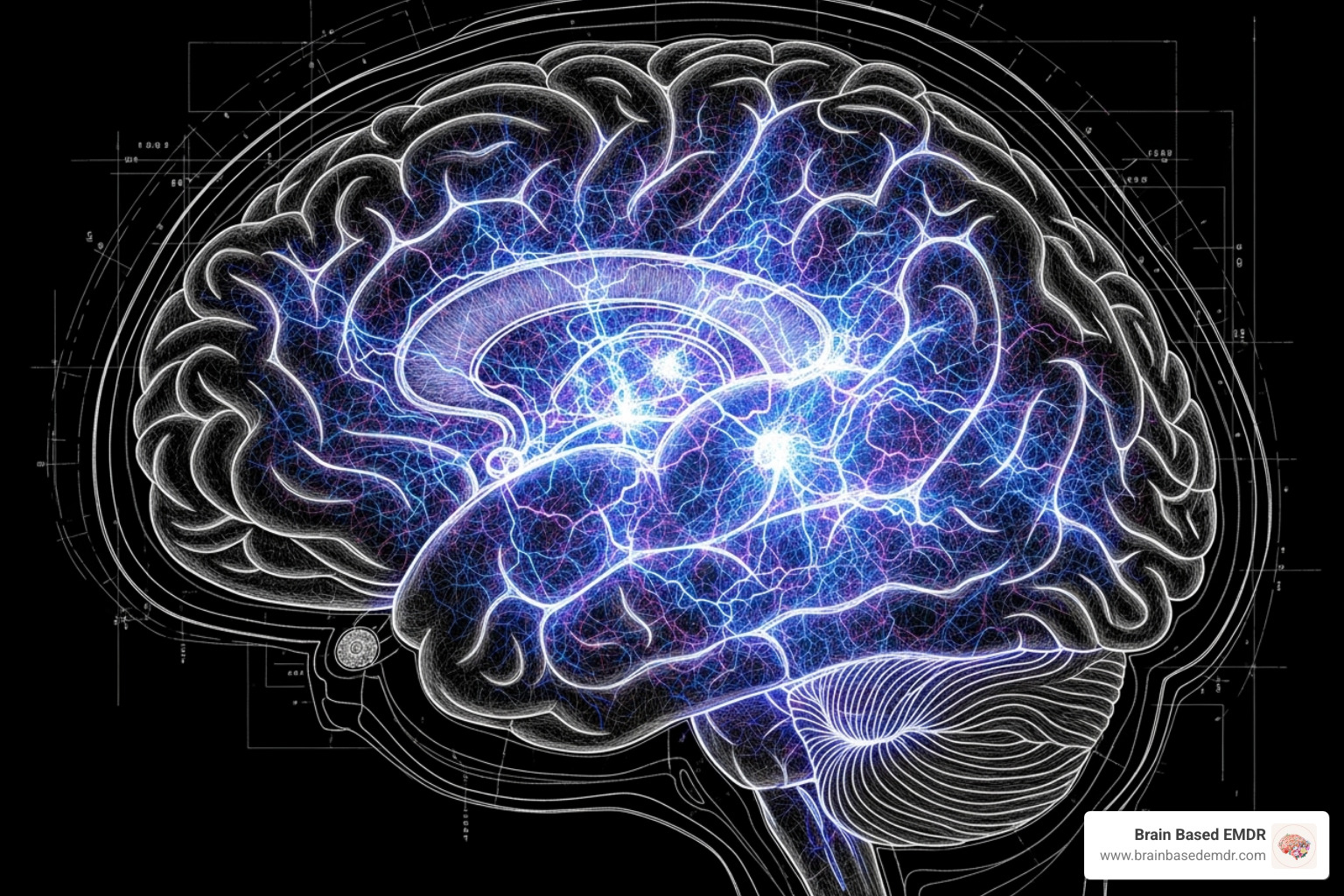EMDR Therapy Training 2025: Transform Your Practice with Brain-Based Trauma Treatment

EMDR therapy training in 2025 offers mental health professionals across multiple states the opportunity to master this evidence-based trauma treatment approach that's revolutionizing therapeutic outcomes. As demand grows for effective interventions addressing complex trauma, anxiety disorders, and somatic disorders, EMDR therapy has become an essential skill for modern clinicians.
As a solo practitioner specializing in brain-based EMDR therapy education, I understand the unique challenges clinicians face when working with complex cases. Traditional approaches often fall short, leaving both therapists and clients feeling stuck. EMDR therapy (Eye Movement Desensitization and Reprocessing) provides a powerful solution backed by over 30 controlled research studies demonstrating its effectiveness with trauma, PTSD, anxiety, and depression.
Brain Based EMDR offers comprehensive online EMDR basic training programs accessible to licensed professionals across multiple locations including Raleigh, NC; Greenville, SC; Virginia Beach, VA; Hickory, NC; Highland Heights, KY; Las Vegas, NV; New York, NY; Los Angeles, CA; Chicago, IL; and Dallas, TX. This accessibility ensures that quality EMDR therapy education reaches clinicians regardless of their geographic location.
Understanding EMDR Therapy: A Neuroscience-Driven Approach
EMDR therapy works by helping clients process traumatic memories that have become "stuck" in the nervous system. Unlike traditional therapy approaches, EMDR therapy integrates bilateral stimulation to activate the brain's natural healing mechanisms, allowing for adaptive processing of disturbing memories and experiences.
The therapy follows an eight-phase protocol that guides clients through a structured process of memory reprocessing. This systematic approach helps transform how traumatic memories are stored in the brain, reducing their emotional charge and allowing clients to develop more adaptive beliefs about themselves and their experiences.
What sets brain-based EMDR therapy apart is its foundation in neuroscience research. Understanding how trauma affects the brain's information processing system allows therapists to work more effectively with clients' natural healing capacities. This knowledge enhances therapeutic outcomes and builds confidence in both the EMDR therapist and client.
EMDRIA Approved Training Standards
Quality EMDR basic training must meet EMDRIA (EMDR International Association) requirements, which serve as the gold standard for consistent, high-quality education. EMDRIA approved standards ensure participants learn the same research-validated protocols that have helped millions of trauma survivors worldwide.
The comprehensive course curriculum includes 40 hours of instruction divided into 20 hours of didactic learning and 20 hours of supervised practicum. This structure ensures that theoretical knowledge is immediately applied through hands-on practice under expert guidance from an EMDRIA approved consultant.
EMDRIA approved programs must teach Dr. Francine Shapiro's original model as designed, maintaining the integrity of this evidence-based approach. This standardization ensures that regardless of where you receive your course instruction, you're learning the same proven methodology that has demonstrated effectiveness across diverse populations and trauma types.
Brain Based EMDR maintains full EMDRIA approval, meeting all EMDRIA requirements for quality instruction, ethical guidelines, and adherence to established procedures. This approval guarantees that your course completion will be recognized by colleagues, insurance companies, and certification boards.
Registration and Eligibility Requirements
EMDR basic training is designed for licensed mental health professionals ready to expand their clinical expertise. The registration fee covers comprehensive course materials, consultation hours, and ongoing support resources essential for successful EMDR therapy integration.
Eligible participants include psychologists, social workers, licensed mental health counselors, marriage and family therapists, psychiatrists, and psychiatric nurse practitioners. Pre-licensed professionals currently working toward state licensure can also complete registration if they are accumulating supervised clinical hours and maintaining an active caseload.
Graduate students in mental health programs are eligible for registration during the clinical portion of their studies, specifically during practicum or internship phases when they're actively seeing clients. The Florida Board and other state licensing boards recognize EMDRIA approved education for continuing education credit.
The most crucial requirement is maintaining an active caseload with individual psychotherapy clients. This ensures that course participants can immediately apply learned skills and engage meaningfully in case discussions during consultation hours.

Comprehensive Course Components
Didactic Learning Foundation
The 20-hour didactic component covers essential theoretical foundations including trauma theory, neurobiology of trauma, and the eight-phase EMDR therapy protocol. Participants learn about memory processing, dual attention mechanisms, and the adaptive information processing model that underlies EMDR therapy's effectiveness.
This theoretical foundation includes resource development techniques, cognitive interweaves, and future templates that enhance treatment outcomes. Understanding these procedures is crucial for addressing blocked processing and ensuring significant progress in complex cases.
Hands-On Practicum Experience
The 20-hour practicum component provides intensive hands-on practice with the EMDR therapy protocol. Participants work in pairs under close supervision, practicing each phase of treatment while receiving immediate feedback and guidance from experienced consultants.
This experiential learning ensures that theoretical knowledge translates into practical skills. Small group sizes allow for personalized attention, ensuring that each participant feels confident and competent before completing their course requirements.
Essential Consultation Support
Ten hours of consultation are included as part of the comprehensive course experience. These small-group consultation hours provide ongoing support as participants begin integrating EMDR therapy into their practice with actual clients.
Consultation hours are facilitated by experienced EMDR consultants who provide guidance through challenging cases, troubleshoot blocked processing difficulties, and ensure safe, effective implementation of EMDR therapy protocols. Additional consultation hours beyond the initial ten hours are available for those seeking extended support.
Online Training Accessibility and Scheduling
Virtual course delivery has revolutionized access to quality EMDR therapy education. Clinicians across all our target locations can now access the same high-quality instruction without travel expenses or scheduling constraints, with flexible training dates to accommodate busy professional schedules.
Modern online platforms provide surprisingly interactive experiences through small group sizes, breakout rooms for supervised practicum, and real-time feedback opportunities. The virtual format requires only stable internet connection, webcam, and quiet learning space.
Online course delivery offers several advantages including cost savings on travel and accommodation, flexible training dates, and the comfort of learning from your own environment. The curriculum remains identical to in-person instruction, maintaining the same rigorous EMDRIA approved standards.
Resilience-Focused EMDR Therapy Approach
Brain Based EMDR therapy education goes beyond basic protocol instruction to incorporate resilience-building, parts work, and somatic techniques for deeper client transformation. This approach recognizes that effective trauma treatment must address not only symptom reduction but also the development of lasting coping resources.
The resilience-focused model emphasizes building client strengths and internal resources before processing traumatic material. Resource development techniques enhance treatment safety and improve outcomes by ensuring clients have adequate stabilization skills for processing different types of trauma presentations.
Integration of somatic awareness helps clients develop better connection with their bodies and nervous system responses. This embodied approach supports more complete reprocessing and helps prevent re-traumatization during EMDR therapy sessions.
Advanced EMDR Training Opportunities
Beyond EMDR basic training, advanced EMDR training workshops address specialized applications and complex trauma presentations. These programs allow experienced EMDR therapists to deepen their expertise in specific areas of interest through advanced EMDR procedures.
Advanced EMDR training topics include working with complex PTSD and dissociation, attachment-focused applications, and integration with other therapeutic modalities. These specialized programs prepare clinicians for the most challenging cases while maintaining the integrity of the EMDR therapy model.
Advanced EMDR training demonstrates ongoing commitment to professional development and enhanced client care. These workshops typically offer additional CE hours while expanding therapeutic capabilities for working with children, first responders, and other specialized populations.
From EMDR Basic Training to EMDRIA Approved EMDR Therapist
Completing EMDRIA approved EMDR basic training earns "EMDR Trained" status, qualifying participants to begin practicing EMDR therapy. All course components must be completed within 12 months of the start date to maintain program integrity and meet EMDRIA requirements.
"EMDRIA Approved EMDR Therapist" represents a higher level of expertise requiring significant post-course experience including at least 50 EMDR therapy sessions, 20 additional consultation hours, and advanced workshop completion. This optional credential demonstrates advanced competency and commitment to the field.
The certification process ensures ongoing skill development and adherence to best practices. While not required for practice, becoming an EMDRIA approved EMDR therapist provides professional recognition and may enhance referral opportunities.
Integration into Clinical Practice
Successful EMDR therapy integration requires understanding how this approach complements existing therapeutic skills. EMDR therapy enhances rather than replaces other evidence-based interventions, providing powerful tools for addressing trauma-related symptoms across a full range of presentations.
Learning to assess client readiness and stability before beginning EMDR therapy processing is crucial for safe practice. Course instruction includes comprehensive guidance on contraindications, preparation requirements, and stabilization techniques essential for working with complex cases.
Effective target identification and treatment planning ensures that EMDR therapy sessions address the most relevant memories and experiences. This systematic approach maximizes therapeutic efficiency and promotes significant progress in clients' lives.
Working with Diverse Populations and Disorders
Quality EMDR therapy education addresses cultural considerations and collective trauma to prepare clinicians for diverse client populations. Understanding how trauma manifests across different cultural contexts enhances therapeutic effectiveness and supports better outcomes.
EMDR therapy applications extend beyond PTSD to include anxiety disorders, depression, addictions, and somatic disorders. The versatility of this approach makes it valuable for therapists working with children, first responders, and other specialized populations requiring trauma-informed care.
Culturally responsive EMDR therapy practice requires awareness of historical trauma, systemic oppression, and cultural healing traditions. Course content includes discussion of these factors and their implications for treatment planning and implementation.
Professional Development Investment
EMDR therapy education represents a significant investment in professional development that pays dividends through enhanced clinical capabilities and improved client outcomes. The skills learned transform how clinicians understand and work with all clients, not just those with obvious trauma histories.
Completing 40 CE hours through EMDR basic training contributes substantially toward continuing education requirements while building expertise in one of the most effective trauma treatments available. Many programs also offer NBCC credit recognition for additional professional development value.
The confidence and competence gained through quality EMDR therapy education often reinvigorates clinical practice, providing new tools for cases where traditional approaches have plateaued.
Building Clinical Confidence and Skills
EMDR therapy education provides concrete tools for those challenging moments when therapy feels stuck and traditional approaches aren't creating lasting change. Having effective interventions for trauma-related symptoms builds therapeutic confidence and reduces clinician burnout.
Understanding the neuroscience behind EMDR therapy's effectiveness helps therapists explain the process to clients, building treatment engagement and compliance. This educational component enhances the therapeutic alliance and supports better outcomes across different types of presentations.
The systematic nature of EMDR therapy protocols provides structure for addressing complex presentations while maintaining flexibility for individual client needs and concerns.

Ongoing Support and Resources
Post-course support through online learning platforms, resource libraries, and professional communities provides valuable ongoing assistance. These resources help newly trained clinicians maintain confidence as they integrate EMDR therapy into their practice with real clients.
Access to continuing education opportunities ensures that EMDR therapy skills continue developing beyond basic course completion. Regular skill updates and advanced technique instruction support professional growth and enhanced client care.
Professional networking with other EMDR therapists creates referral opportunities and collegial support systems that benefit both practitioners and clients seeking specialized trauma treatment.
Trauma-Informed Care Excellence
EMDR therapy education emphasizes trauma-informed care principles that enhance all therapeutic interactions. Understanding trauma's impact on the nervous system, memory processing, and relational capacity improves clinical effectiveness across all client presentations and disorders.
The brain-based approach taught in quality EMDR therapy education provides scientific foundation for therapeutic interventions, building credibility with clients and colleagues. This evidence-based framework supports effective treatment planning and case conceptualization.
Resilience-building components of comprehensive EMDR therapy education help clients develop lasting emotional regulation skills, moving beyond symptom management to genuine post-traumatic growth and healing.

Conclusion
As the demand for effective trauma treatment continues growing, EMDR therapy skills provide essential capabilities for mental health professionals. The investment in quality education transforms both clinical practice and client outcomes significantly.
Brain Based EMDR offers flexible online course options with various training dates accessible across multiple states, making it convenient to begin this transformative professional development journey. Our EMDRIA approved programs provide the same rigorous standards regardless of format.
For questions about training dates, registration fee details, course schedules, or to discuss how EMDR therapy education can enhance your practice, please contact us directly. We're committed to supporting your professional development and helping you provide the most effective care possible to your clients.
Your clients deserve access to the most effective trauma treatments available. Your practice deserves the confidence that comes with having tools that truly work. EMDR therapy education provides both, opening new possibilities for healing and growth in your therapeutic work.

